Ethical Analysis of Robotic Surgery: A Service Management Perspective
VerifiedAdded on 2022/07/29
|8
|1936
|20
Discussion Board Post
AI Summary
This discussion board post, centered on service management, delves into the ethical complexities surrounding robotic surgery. It examines the responsibilities of IT professionals in ensuring the accuracy and safety of robotic surgical systems, particularly in light of potential failures and patient fatalities. The post applies ethical theories such as utilitarianism, deontology, social contract theory, and character-based ethics to evaluate the actions and accountability of IT professionals and medical staff. It also discusses the application of ACS codes, specifically focusing on the enhancement of the quality of life and the primacy of public interest. The post concludes by analyzing the ethical implications, emphasizing the importance of coding precision, stakeholder awareness, and adequate training to mitigate risks and ensure patient well-being. The post references relevant literature to support its arguments.

Running head: SERVICE MANAGEMENT
1
Service Management
Student’s Name
Institutional Affiliation
1
Service Management
Student’s Name
Institutional Affiliation
Paraphrase This Document
Need a fresh take? Get an instant paraphrase of this document with our AI Paraphraser
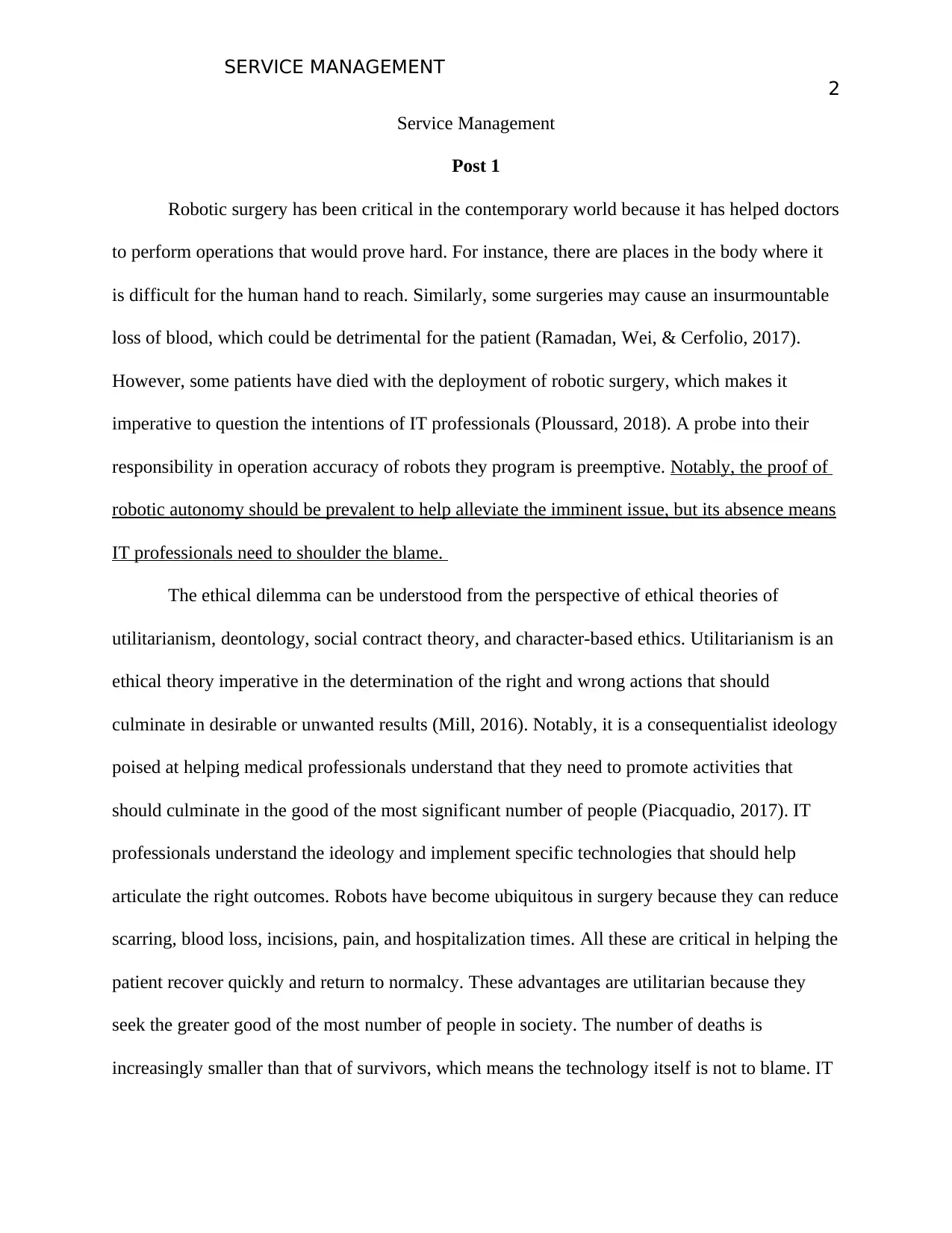
SERVICE MANAGEMENT
2
Service Management
Post 1
Robotic surgery has been critical in the contemporary world because it has helped doctors
to perform operations that would prove hard. For instance, there are places in the body where it
is difficult for the human hand to reach. Similarly, some surgeries may cause an insurmountable
loss of blood, which could be detrimental for the patient (Ramadan, Wei, & Cerfolio, 2017).
However, some patients have died with the deployment of robotic surgery, which makes it
imperative to question the intentions of IT professionals (Ploussard, 2018). A probe into their
responsibility in operation accuracy of robots they program is preemptive. Notably, the proof of
robotic autonomy should be prevalent to help alleviate the imminent issue, but its absence means
IT professionals need to shoulder the blame.
The ethical dilemma can be understood from the perspective of ethical theories of
utilitarianism, deontology, social contract theory, and character-based ethics. Utilitarianism is an
ethical theory imperative in the determination of the right and wrong actions that should
culminate in desirable or unwanted results (Mill, 2016). Notably, it is a consequentialist ideology
poised at helping medical professionals understand that they need to promote activities that
should culminate in the good of the most significant number of people (Piacquadio, 2017). IT
professionals understand the ideology and implement specific technologies that should help
articulate the right outcomes. Robots have become ubiquitous in surgery because they can reduce
scarring, blood loss, incisions, pain, and hospitalization times. All these are critical in helping the
patient recover quickly and return to normalcy. These advantages are utilitarian because they
seek the greater good of the most number of people in society. The number of deaths is
increasingly smaller than that of survivors, which means the technology itself is not to blame. IT
2
Service Management
Post 1
Robotic surgery has been critical in the contemporary world because it has helped doctors
to perform operations that would prove hard. For instance, there are places in the body where it
is difficult for the human hand to reach. Similarly, some surgeries may cause an insurmountable
loss of blood, which could be detrimental for the patient (Ramadan, Wei, & Cerfolio, 2017).
However, some patients have died with the deployment of robotic surgery, which makes it
imperative to question the intentions of IT professionals (Ploussard, 2018). A probe into their
responsibility in operation accuracy of robots they program is preemptive. Notably, the proof of
robotic autonomy should be prevalent to help alleviate the imminent issue, but its absence means
IT professionals need to shoulder the blame.
The ethical dilemma can be understood from the perspective of ethical theories of
utilitarianism, deontology, social contract theory, and character-based ethics. Utilitarianism is an
ethical theory imperative in the determination of the right and wrong actions that should
culminate in desirable or unwanted results (Mill, 2016). Notably, it is a consequentialist ideology
poised at helping medical professionals understand that they need to promote activities that
should culminate in the good of the most significant number of people (Piacquadio, 2017). IT
professionals understand the ideology and implement specific technologies that should help
articulate the right outcomes. Robots have become ubiquitous in surgery because they can reduce
scarring, blood loss, incisions, pain, and hospitalization times. All these are critical in helping the
patient recover quickly and return to normalcy. These advantages are utilitarian because they
seek the greater good of the most number of people in society. The number of deaths is
increasingly smaller than that of survivors, which means the technology itself is not to blame. IT
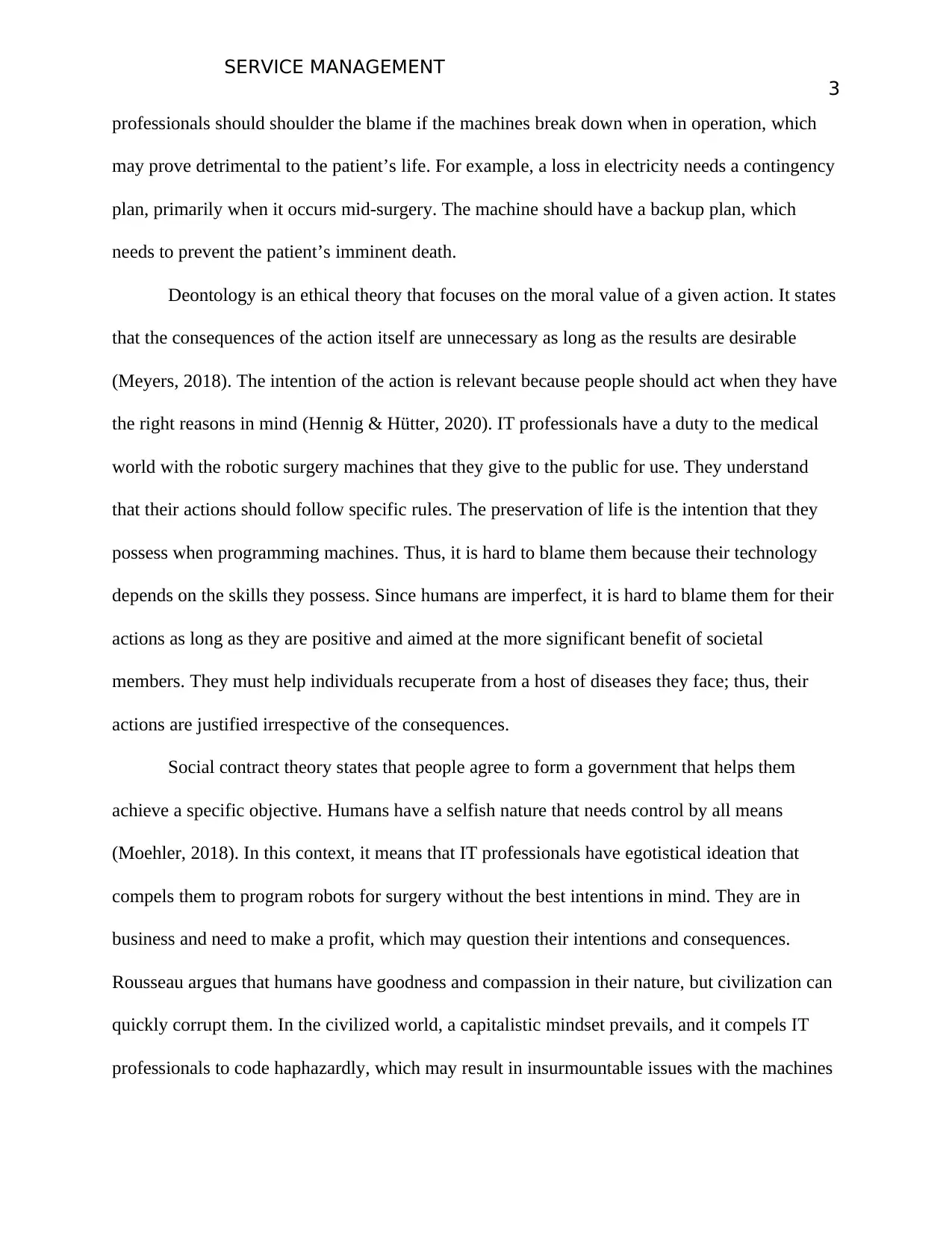
SERVICE MANAGEMENT
3
professionals should shoulder the blame if the machines break down when in operation, which
may prove detrimental to the patient’s life. For example, a loss in electricity needs a contingency
plan, primarily when it occurs mid-surgery. The machine should have a backup plan, which
needs to prevent the patient’s imminent death.
Deontology is an ethical theory that focuses on the moral value of a given action. It states
that the consequences of the action itself are unnecessary as long as the results are desirable
(Meyers, 2018). The intention of the action is relevant because people should act when they have
the right reasons in mind (Hennig & Hütter, 2020). IT professionals have a duty to the medical
world with the robotic surgery machines that they give to the public for use. They understand
that their actions should follow specific rules. The preservation of life is the intention that they
possess when programming machines. Thus, it is hard to blame them because their technology
depends on the skills they possess. Since humans are imperfect, it is hard to blame them for their
actions as long as they are positive and aimed at the more significant benefit of societal
members. They must help individuals recuperate from a host of diseases they face; thus, their
actions are justified irrespective of the consequences.
Social contract theory states that people agree to form a government that helps them
achieve a specific objective. Humans have a selfish nature that needs control by all means
(Moehler, 2018). In this context, it means that IT professionals have egotistical ideation that
compels them to program robots for surgery without the best intentions in mind. They are in
business and need to make a profit, which may question their intentions and consequences.
Rousseau argues that humans have goodness and compassion in their nature, but civilization can
quickly corrupt them. In the civilized world, a capitalistic mindset prevails, and it compels IT
professionals to code haphazardly, which may result in insurmountable issues with the machines
3
professionals should shoulder the blame if the machines break down when in operation, which
may prove detrimental to the patient’s life. For example, a loss in electricity needs a contingency
plan, primarily when it occurs mid-surgery. The machine should have a backup plan, which
needs to prevent the patient’s imminent death.
Deontology is an ethical theory that focuses on the moral value of a given action. It states
that the consequences of the action itself are unnecessary as long as the results are desirable
(Meyers, 2018). The intention of the action is relevant because people should act when they have
the right reasons in mind (Hennig & Hütter, 2020). IT professionals have a duty to the medical
world with the robotic surgery machines that they give to the public for use. They understand
that their actions should follow specific rules. The preservation of life is the intention that they
possess when programming machines. Thus, it is hard to blame them because their technology
depends on the skills they possess. Since humans are imperfect, it is hard to blame them for their
actions as long as they are positive and aimed at the more significant benefit of societal
members. They must help individuals recuperate from a host of diseases they face; thus, their
actions are justified irrespective of the consequences.
Social contract theory states that people agree to form a government that helps them
achieve a specific objective. Humans have a selfish nature that needs control by all means
(Moehler, 2018). In this context, it means that IT professionals have egotistical ideation that
compels them to program robots for surgery without the best intentions in mind. They are in
business and need to make a profit, which may question their intentions and consequences.
Rousseau argues that humans have goodness and compassion in their nature, but civilization can
quickly corrupt them. In the civilized world, a capitalistic mindset prevails, and it compels IT
professionals to code haphazardly, which may result in insurmountable issues with the machines
⊘ This is a preview!⊘
Do you want full access?
Subscribe today to unlock all pages.

Trusted by 1+ million students worldwide
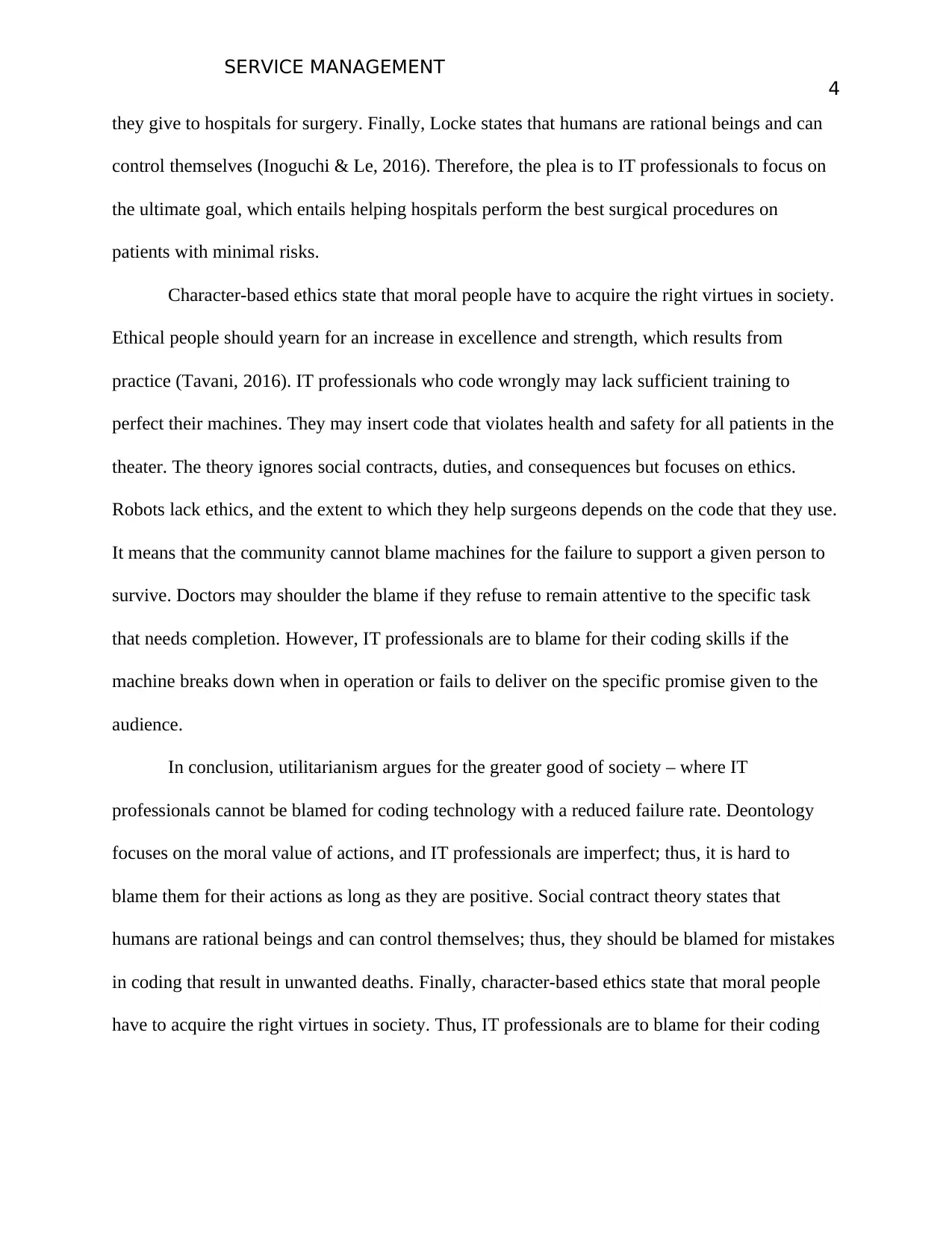
SERVICE MANAGEMENT
4
they give to hospitals for surgery. Finally, Locke states that humans are rational beings and can
control themselves (Inoguchi & Le, 2016). Therefore, the plea is to IT professionals to focus on
the ultimate goal, which entails helping hospitals perform the best surgical procedures on
patients with minimal risks.
Character-based ethics state that moral people have to acquire the right virtues in society.
Ethical people should yearn for an increase in excellence and strength, which results from
practice (Tavani, 2016). IT professionals who code wrongly may lack sufficient training to
perfect their machines. They may insert code that violates health and safety for all patients in the
theater. The theory ignores social contracts, duties, and consequences but focuses on ethics.
Robots lack ethics, and the extent to which they help surgeons depends on the code that they use.
It means that the community cannot blame machines for the failure to support a given person to
survive. Doctors may shoulder the blame if they refuse to remain attentive to the specific task
that needs completion. However, IT professionals are to blame for their coding skills if the
machine breaks down when in operation or fails to deliver on the specific promise given to the
audience.
In conclusion, utilitarianism argues for the greater good of society – where IT
professionals cannot be blamed for coding technology with a reduced failure rate. Deontology
focuses on the moral value of actions, and IT professionals are imperfect; thus, it is hard to
blame them for their actions as long as they are positive. Social contract theory states that
humans are rational beings and can control themselves; thus, they should be blamed for mistakes
in coding that result in unwanted deaths. Finally, character-based ethics state that moral people
have to acquire the right virtues in society. Thus, IT professionals are to blame for their coding
4
they give to hospitals for surgery. Finally, Locke states that humans are rational beings and can
control themselves (Inoguchi & Le, 2016). Therefore, the plea is to IT professionals to focus on
the ultimate goal, which entails helping hospitals perform the best surgical procedures on
patients with minimal risks.
Character-based ethics state that moral people have to acquire the right virtues in society.
Ethical people should yearn for an increase in excellence and strength, which results from
practice (Tavani, 2016). IT professionals who code wrongly may lack sufficient training to
perfect their machines. They may insert code that violates health and safety for all patients in the
theater. The theory ignores social contracts, duties, and consequences but focuses on ethics.
Robots lack ethics, and the extent to which they help surgeons depends on the code that they use.
It means that the community cannot blame machines for the failure to support a given person to
survive. Doctors may shoulder the blame if they refuse to remain attentive to the specific task
that needs completion. However, IT professionals are to blame for their coding skills if the
machine breaks down when in operation or fails to deliver on the specific promise given to the
audience.
In conclusion, utilitarianism argues for the greater good of society – where IT
professionals cannot be blamed for coding technology with a reduced failure rate. Deontology
focuses on the moral value of actions, and IT professionals are imperfect; thus, it is hard to
blame them for their actions as long as they are positive. Social contract theory states that
humans are rational beings and can control themselves; thus, they should be blamed for mistakes
in coding that result in unwanted deaths. Finally, character-based ethics state that moral people
have to acquire the right virtues in society. Thus, IT professionals are to blame for their coding
Paraphrase This Document
Need a fresh take? Get an instant paraphrase of this document with our AI Paraphraser
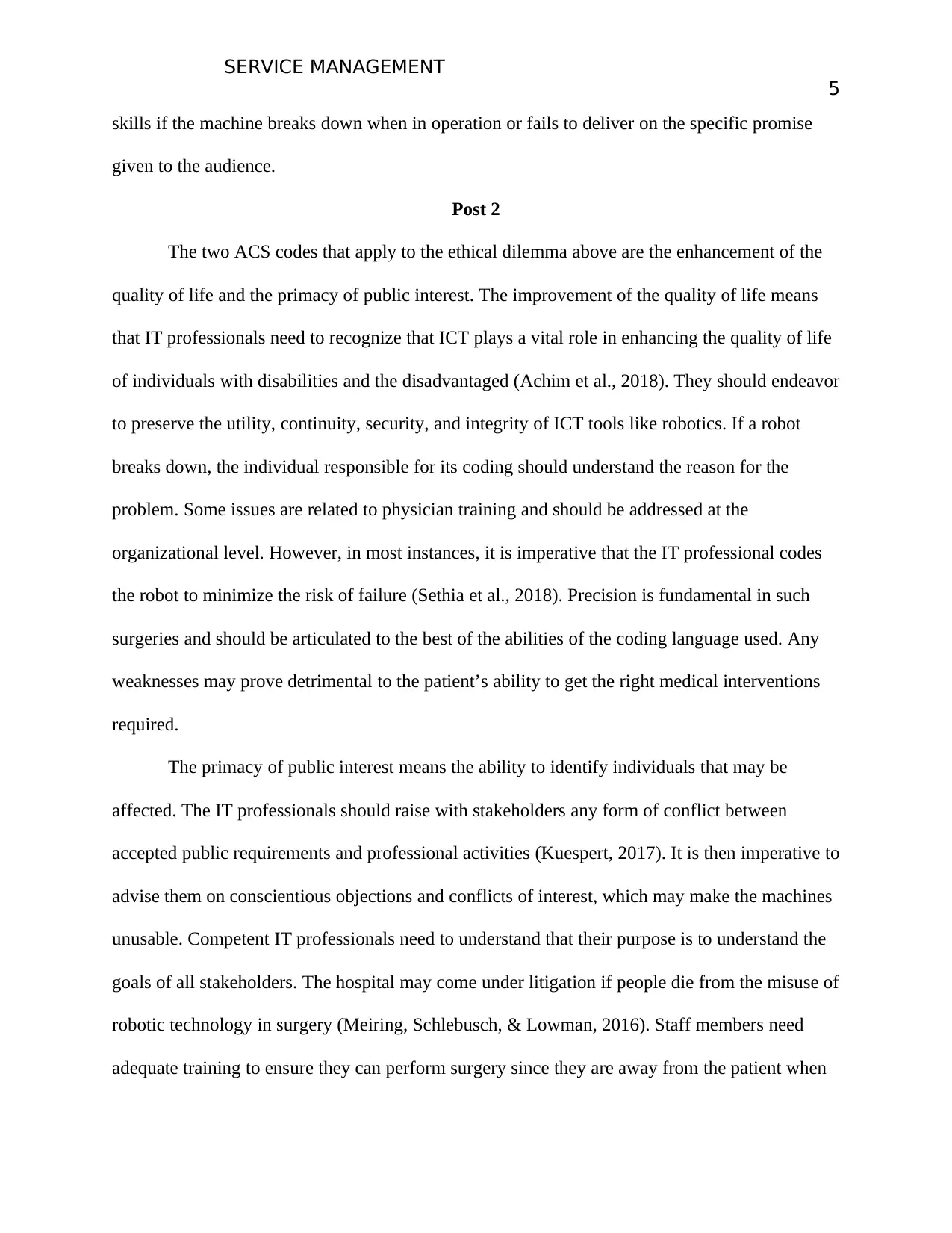
SERVICE MANAGEMENT
5
skills if the machine breaks down when in operation or fails to deliver on the specific promise
given to the audience.
Post 2
The two ACS codes that apply to the ethical dilemma above are the enhancement of the
quality of life and the primacy of public interest. The improvement of the quality of life means
that IT professionals need to recognize that ICT plays a vital role in enhancing the quality of life
of individuals with disabilities and the disadvantaged (Achim et al., 2018). They should endeavor
to preserve the utility, continuity, security, and integrity of ICT tools like robotics. If a robot
breaks down, the individual responsible for its coding should understand the reason for the
problem. Some issues are related to physician training and should be addressed at the
organizational level. However, in most instances, it is imperative that the IT professional codes
the robot to minimize the risk of failure (Sethia et al., 2018). Precision is fundamental in such
surgeries and should be articulated to the best of the abilities of the coding language used. Any
weaknesses may prove detrimental to the patient’s ability to get the right medical interventions
required.
The primacy of public interest means the ability to identify individuals that may be
affected. The IT professionals should raise with stakeholders any form of conflict between
accepted public requirements and professional activities (Kuespert, 2017). It is then imperative to
advise them on conscientious objections and conflicts of interest, which may make the machines
unusable. Competent IT professionals need to understand that their purpose is to understand the
goals of all stakeholders. The hospital may come under litigation if people die from the misuse of
robotic technology in surgery (Meiring, Schlebusch, & Lowman, 2016). Staff members need
adequate training to ensure they can perform surgery since they are away from the patient when
5
skills if the machine breaks down when in operation or fails to deliver on the specific promise
given to the audience.
Post 2
The two ACS codes that apply to the ethical dilemma above are the enhancement of the
quality of life and the primacy of public interest. The improvement of the quality of life means
that IT professionals need to recognize that ICT plays a vital role in enhancing the quality of life
of individuals with disabilities and the disadvantaged (Achim et al., 2018). They should endeavor
to preserve the utility, continuity, security, and integrity of ICT tools like robotics. If a robot
breaks down, the individual responsible for its coding should understand the reason for the
problem. Some issues are related to physician training and should be addressed at the
organizational level. However, in most instances, it is imperative that the IT professional codes
the robot to minimize the risk of failure (Sethia et al., 2018). Precision is fundamental in such
surgeries and should be articulated to the best of the abilities of the coding language used. Any
weaknesses may prove detrimental to the patient’s ability to get the right medical interventions
required.
The primacy of public interest means the ability to identify individuals that may be
affected. The IT professionals should raise with stakeholders any form of conflict between
accepted public requirements and professional activities (Kuespert, 2017). It is then imperative to
advise them on conscientious objections and conflicts of interest, which may make the machines
unusable. Competent IT professionals need to understand that their purpose is to understand the
goals of all stakeholders. The hospital may come under litigation if people die from the misuse of
robotic technology in surgery (Meiring, Schlebusch, & Lowman, 2016). Staff members need
adequate training to ensure they can perform surgery since they are away from the patient when

SERVICE MANAGEMENT
6
using the machine to achieve the objective. The risk of failure of the malfunction is adequate to
let IT professionals know that they should code robots to help humans recuperate rather than
harm them.
6
using the machine to achieve the objective. The risk of failure of the malfunction is adequate to
let IT professionals know that they should code robots to help humans recuperate rather than
harm them.
⊘ This is a preview!⊘
Do you want full access?
Subscribe today to unlock all pages.

Trusted by 1+ million students worldwide
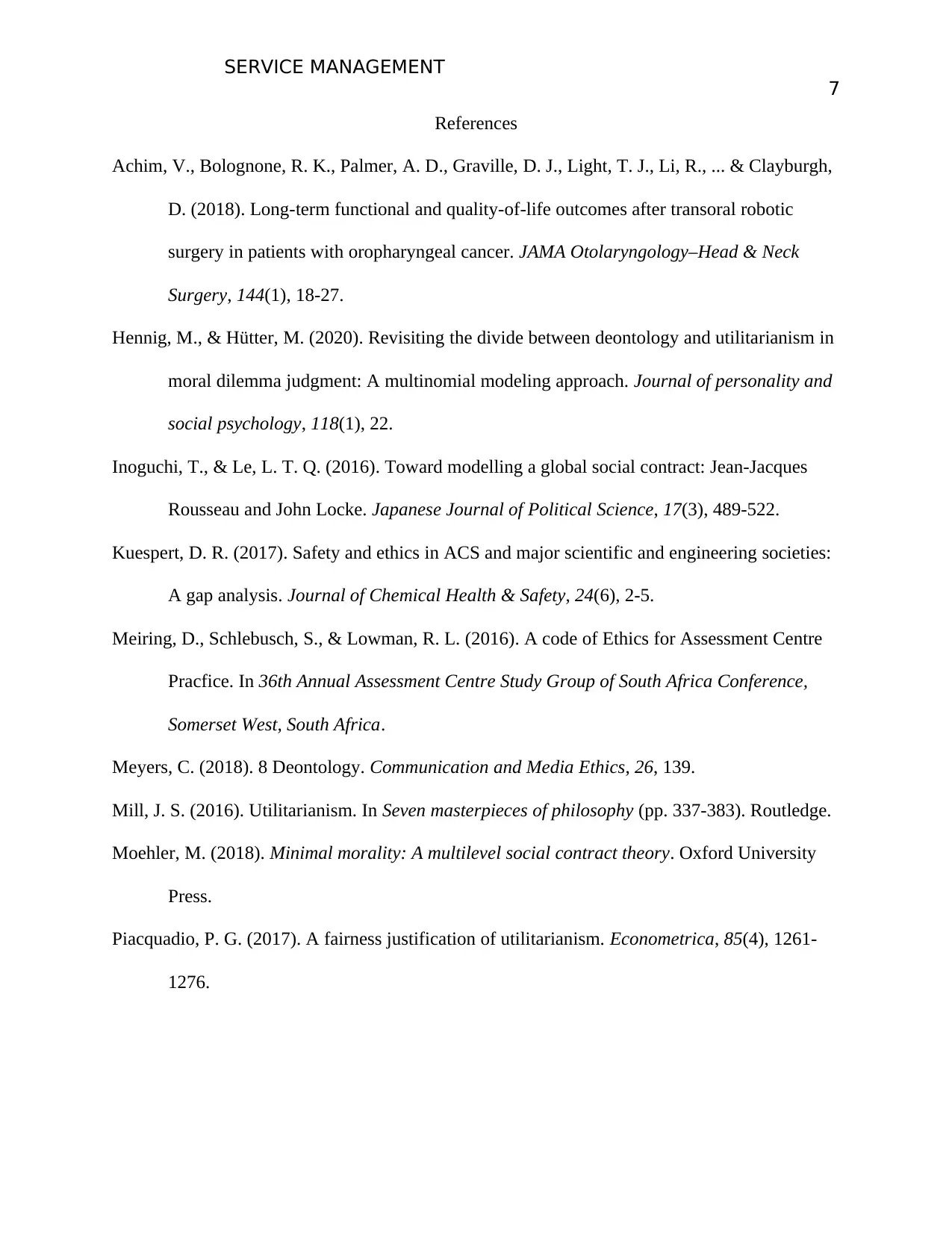
SERVICE MANAGEMENT
7
References
Achim, V., Bolognone, R. K., Palmer, A. D., Graville, D. J., Light, T. J., Li, R., ... & Clayburgh,
D. (2018). Long-term functional and quality-of-life outcomes after transoral robotic
surgery in patients with oropharyngeal cancer. JAMA Otolaryngology–Head & Neck
Surgery, 144(1), 18-27.
Hennig, M., & Hütter, M. (2020). Revisiting the divide between deontology and utilitarianism in
moral dilemma judgment: A multinomial modeling approach. Journal of personality and
social psychology, 118(1), 22.
Inoguchi, T., & Le, L. T. Q. (2016). Toward modelling a global social contract: Jean-Jacques
Rousseau and John Locke. Japanese Journal of Political Science, 17(3), 489-522.
Kuespert, D. R. (2017). Safety and ethics in ACS and major scientific and engineering societies:
A gap analysis. Journal of Chemical Health & Safety, 24(6), 2-5.
Meiring, D., Schlebusch, S., & Lowman, R. L. (2016). A code of Ethics for Assessment Centre
Pracfice. In 36th Annual Assessment Centre Study Group of South Africa Conference,
Somerset West, South Africa.
Meyers, C. (2018). 8 Deontology. Communication and Media Ethics, 26, 139.
Mill, J. S. (2016). Utilitarianism. In Seven masterpieces of philosophy (pp. 337-383). Routledge.
Moehler, M. (2018). Minimal morality: A multilevel social contract theory. Oxford University
Press.
Piacquadio, P. G. (2017). A fairness justification of utilitarianism. Econometrica, 85(4), 1261-
1276.
7
References
Achim, V., Bolognone, R. K., Palmer, A. D., Graville, D. J., Light, T. J., Li, R., ... & Clayburgh,
D. (2018). Long-term functional and quality-of-life outcomes after transoral robotic
surgery in patients with oropharyngeal cancer. JAMA Otolaryngology–Head & Neck
Surgery, 144(1), 18-27.
Hennig, M., & Hütter, M. (2020). Revisiting the divide between deontology and utilitarianism in
moral dilemma judgment: A multinomial modeling approach. Journal of personality and
social psychology, 118(1), 22.
Inoguchi, T., & Le, L. T. Q. (2016). Toward modelling a global social contract: Jean-Jacques
Rousseau and John Locke. Japanese Journal of Political Science, 17(3), 489-522.
Kuespert, D. R. (2017). Safety and ethics in ACS and major scientific and engineering societies:
A gap analysis. Journal of Chemical Health & Safety, 24(6), 2-5.
Meiring, D., Schlebusch, S., & Lowman, R. L. (2016). A code of Ethics for Assessment Centre
Pracfice. In 36th Annual Assessment Centre Study Group of South Africa Conference,
Somerset West, South Africa.
Meyers, C. (2018). 8 Deontology. Communication and Media Ethics, 26, 139.
Mill, J. S. (2016). Utilitarianism. In Seven masterpieces of philosophy (pp. 337-383). Routledge.
Moehler, M. (2018). Minimal morality: A multilevel social contract theory. Oxford University
Press.
Piacquadio, P. G. (2017). A fairness justification of utilitarianism. Econometrica, 85(4), 1261-
1276.
Paraphrase This Document
Need a fresh take? Get an instant paraphrase of this document with our AI Paraphraser
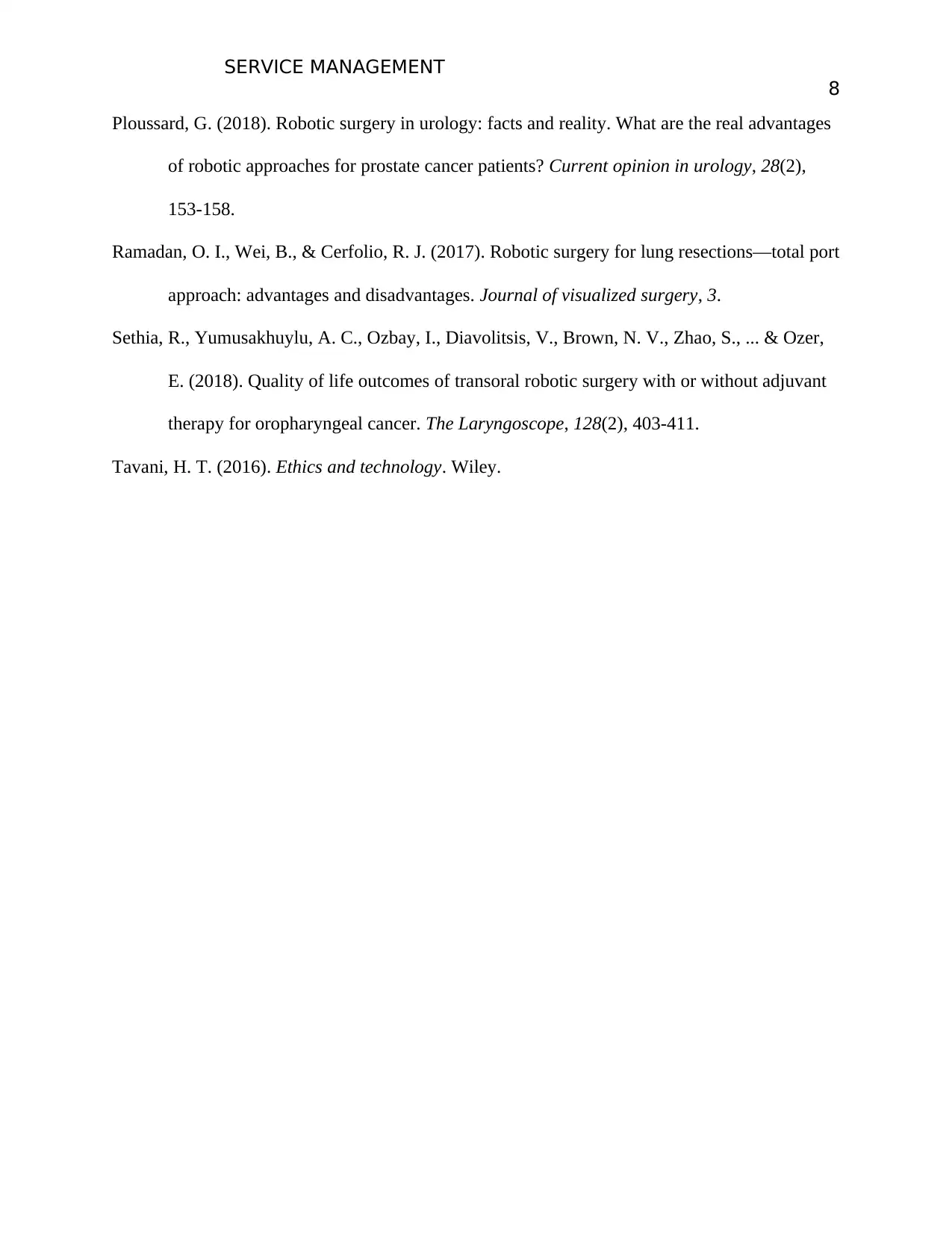
SERVICE MANAGEMENT
8
Ploussard, G. (2018). Robotic surgery in urology: facts and reality. What are the real advantages
of robotic approaches for prostate cancer patients? Current opinion in urology, 28(2),
153-158.
Ramadan, O. I., Wei, B., & Cerfolio, R. J. (2017). Robotic surgery for lung resections—total port
approach: advantages and disadvantages. Journal of visualized surgery, 3.
Sethia, R., Yumusakhuylu, A. C., Ozbay, I., Diavolitsis, V., Brown, N. V., Zhao, S., ... & Ozer,
E. (2018). Quality of life outcomes of transoral robotic surgery with or without adjuvant
therapy for oropharyngeal cancer. The Laryngoscope, 128(2), 403-411.
Tavani, H. T. (2016). Ethics and technology. Wiley.
8
Ploussard, G. (2018). Robotic surgery in urology: facts and reality. What are the real advantages
of robotic approaches for prostate cancer patients? Current opinion in urology, 28(2),
153-158.
Ramadan, O. I., Wei, B., & Cerfolio, R. J. (2017). Robotic surgery for lung resections—total port
approach: advantages and disadvantages. Journal of visualized surgery, 3.
Sethia, R., Yumusakhuylu, A. C., Ozbay, I., Diavolitsis, V., Brown, N. V., Zhao, S., ... & Ozer,
E. (2018). Quality of life outcomes of transoral robotic surgery with or without adjuvant
therapy for oropharyngeal cancer. The Laryngoscope, 128(2), 403-411.
Tavani, H. T. (2016). Ethics and technology. Wiley.
1 out of 8
Your All-in-One AI-Powered Toolkit for Academic Success.
+13062052269
info@desklib.com
Available 24*7 on WhatsApp / Email
![[object Object]](/_next/static/media/star-bottom.7253800d.svg)
Unlock your academic potential
Copyright © 2020–2026 A2Z Services. All Rights Reserved. Developed and managed by ZUCOL.


